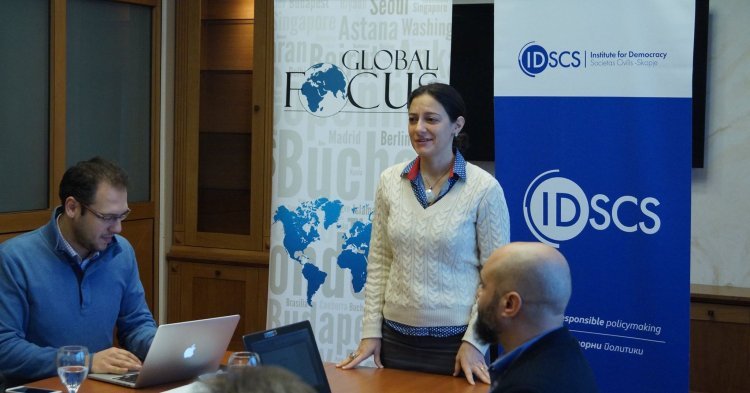Marie Jelenka Kirchner (MK): In 2018, the EU presented its ‘credible enlargement perspective’ to the countries of the Western Balkans. How credible is this perspective in reality?
Oana Popescu (OP): I think we have unfortunately lost a lot of credibility, partly because of the perception of inconsistency on the part of the European Union. More often than not, steps forward are actually taken not in connection to progress on reforms, but according to political circumstances. There is also a perception that the EU has consented to this being a very top-down, rather paternalistic process, and an elite-driven movement.
MK: What are the three biggest challenges right now with regard to the enlargement of the European Union?
OP: On the EU side, it would be making sure that they design the process in a way that they can then really measure countries according to the progress they have made. Secondly, that the EU delivers internally according to its own rules and principles and thirdly, that the EU does not just work with the elites, but with the societies. It is important to understand that this is also a process of Europeanisation and modernisation, not just of integration. Enlargement is not just the adoption of the acquis, but it is actually the transformation of society, of politics, of economy.
MK: And what are the biggest challenges as regards the accession countries?
OP: They have to actually make it credible that they genuinely choose EU integration and that they don’t just want the benefits. This must be a process of shared responsibilities on both sides. I think the Western Balkans unfortunately have developed this mentality of “well, if we don’t like what the EU is doing then we are just going to fake reforms on our own side and try to walk away with the maximum of benefits whilst making the minimum of actual reforms.” The hypocrisy has to stop on both sides.
MK: Does EU enlargement have a credible future?
OP: I don’t believe that the process has lost so much credibility that it has no future. Quite the opposite, and I think it starts to dawn on both the EU and the Western Balkans that both sides are imperfect, that the EU has its own crisis and that the Western Balkans always have their own crises. But if we keep looking towards the overarching goal and show that we want to do this together, then we will be able to do this.
MK: You are from Romania, a country which is very often criticised in Western Europe for not being the “ideal new” member in the EU. Is there anything from that specific perspective that could be drawn as a lesson for further enlargement?
OP: Absolutely, and I think there are lessons to be learnt from the integration of all former Eastern Bloc countries, not just Romania. We need to make sure that the process is inclusive and that the whole of society is taken on board. We have huge inequalities in Romania and in all of the Central and Eastern European countries. Essentially, only a part of the population feels the benefits of EU integration and the facto integrates. The other half sees that there is progress around them, sees that there is tremendous change, but this change never reaches them, and it never translates into better living standards. Of course that generates frustration and it tends to immediately backfire.
MK: How could this process become more inclusive?
OP: We need an inclusive debate before accession. In Romania, we had almost unanimous support for NATO and EU integration, which means we never had a debate about what this means and why we are doing it. The general feeling was that if the political class has the support of the population, why bother to discuss it more? And now we realise that we never really talked to people to explain for instance a conflict of values between what is perceived by some as the traditional values in Romania and the modern, liberal European values. We never genuinely discussed them openly, by listening to the people who are finding it hard to change.
MK: Where does the hostility towards change come from?
OP: Many people feel perhaps just afraid of change. What we have gone through, and what the Western Balkans are also going through, is accelerating change in a brief time frame. That is always stressful. We have seen several categories of people that feel like they have lost something. This something is not necessarily palpable: it is identity, safety and security. There is a feeling among some that we have essentially sold our country to foreign powers.
MK: So, what are the lessons for the Western Balkans?
OP: We have learnt that enlargement is a much more complex process, which doesn’t only happen on paper and is not just institutional. It is never linear and the transformation of society is nothing that happens from moment A to moment B. It is going to be a long process, its rewards are not always going to be immediate or spectacular, but it is about making a clear choice whether you prefer this long and possibly difficult path to prosperity and democracy, or whether are you fine living with what you have right now, or whatever alternative option there is.
MK: You are running for European Parliament as a part of the new Romanian +Plus party. What has brought you to this decision?
OP: I think those of us who still believe in the European idea and look at it idealistically, yet recognise all its shortcomings, need to reform the EU. We really need to start speaking out, there is a need of active promotion and a need for the so-called elites and those of us who have access to education abroad and to travel, to communicate to the rest who perhaps have not had the direct experience of why this would be important to them.
MK: It’s still not too late for a late New Year’s Resolution. What is your EU resolution for 2019? What would you like to accomplish this year?
OP: The number one thing that I would like to do is to make sure that I am one of the advocates for the European idea. And the second one is that I am interested in simply supporting the emergence of new political parties. We are now really at a time when it is no longer left versus right. Instead, it is a bit post-ideological. Now it is old-style politics done for a 20th century world versus the new style of politics done for the 21st century. I am interested in supporting the growth of these new-style parties. I really believe that meaningful action needs to be political if it is to produce real impact.


Follow the comments: |
|
